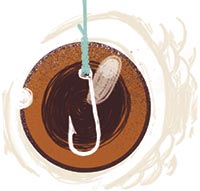Ten years ago this February, a freshly inaugurated George W. Bush received his first official visit from a head of state: Jean Chrétien. By the end of his term, he’d entertained reporters alongside—and at the expense of—three PMs. Relationships between the leaders were in flux, ranging from frosty (Bush’s nickname for Chrétien was “Dino,” as in dinosaur) to genial (Harper was “Steve” and, at one G-8 summit, “Yo, Harper!”). In front of the press corps, though, the routine was unchanging: the American played the comic, and the Canadian the straight man.
The following are snippets from three first forays to the White House.
George W. Bush and Jean Chrétien
February 5, 2001
Q: (through translator): Mr. Prime Minister, considering your good relations… with President Clinton plus what you said in 1993 about relations with [the first] President Bush and then Prime Minister Mulroney, how do you expect your relations with President George W. Bush to be?
PRIME MINISTER Chrétien: (through translator): Our relations will be very good. President Bush is the president of the United States, I’m the prime minister of Canada. We have common interests, we’ll have different interests, and as we said before, it’s very good to have these relations and it’s very good that Canada be seen as an independent country.
PRESIDENT bush: Hold on, I’ve got a very important answer to give. The question was fishing. (Laughter.) We talked about fishing, and I would hope someday to be able to go catch smallmouthed bass on the prime minister’s—as he called it—the equivalent of Camp David. I could use a few techniques when it comes to fishing for smallmouthed bass. And one day, if all works out well, he can come down and catch largemouthed bass on my ranch. (Laughter.)
Q: Golf? Any plans to play golf together?
PRESIDENT bush: If he gives me enough strokes. (Laughter.)
George W. Bush and Paul Martin
April 30, 2004
Q: Mr. President, could you tell us what you’d like to see Canada doing on Iraq, both diplomatically and in terms, eventually, of getting possibly police and troops on the ground there?
PRESIDENT BUSH: My first answer to that is, I want to Canada to do what it feels comfortable doing in Iraq. That’s—and that’s what I told the prime minister before. Canada is an independent nation. Canada makes—will make its decisions based upon her own judgment. The prime minister shares my deep desire for there to be peace in the world. And to the extent that the country feels comfortable in helping that, we’re grateful… There’s a lot of people in the world who don’t believe that people whose skin colour may not be the same as ours can be free and self-govern. I reject that. I reject that strongly. I believe that people who practise the Muslim faith can self-govern. I believe that people whose skins aren’t necessarily—are a different colour than white can self-govern.
And the prime minister—I don’t want to put words in his mouth—but I think he shares that great sense of optimism and possibility. And it’s good to have a friend who shares that with us.
…
PRIME MINISTER MARTIN: I’ve got to say, though, I really do like sharing a press conference with you. You answer those questions perfectly. (Laughter.)
PRESIDENT BUSH: Thank you. Record that.
…
Q: Will the next trip be down at the ranch, Mr. President, for the prime minister?
PRESIDENT BUSH: This is a nice place, but the ranch is even nicer. (Laughter.)
Q: You need to teach him to ride. (Laughter.)
George W. Bush and Stephen Harper
July 6, 2006
president BUSH: We talked about the war on terror, and I told the prime minister how pleased Americans were that the Canadian government did the hard work necessary to disrupt terrorist plots. It just goes to show how safe Canada is. When you’ve got a government that’s active and a police force that’s capable, people ought to be rest assured that Canada is on top of any plots.
Needless to say, the prime minister expressed deep concerns about the Western Hemisphere Travel Initiative. The last time I was with him, he expressed concerns. He basically was a little impatient, if I might clarify your… it seemed like you were impatient, at least (laughter)—and straightforward.
…
president BUSH: And so I assured him that my view is, simple and easy to understand is the operative words. And we will continue our discussions about this initiative, particularly since the Secretary of Homeland Security Chertoff—who is sitting right over there, by the way—will be joining us for lunch. Unless you don’t want me to invite him. (Laughter.)
PRIME MINISTER HARPER: Well, thank you very much, Mr. President, for the invitation and for the kind words. And thank you for doing something I never thought I’d see, which is have the Canadian media stand when I entered the room. But we certainly enjoy that.
…
Q: Mr. President, Mr. Prime Minister, before I ask you a question, I’m just curious what you think of that belt buckle the prime minister gave you as a birthday gift, and are you wearing it?
PRESIDENT BUSH: I hadn’t seen it yet. (Laughter.) Oh, Lee, you gave it away. (Laughter.)
Q: Mr. President, on a serious note, in light of the North Korea missile test, and the fact that North Korea could launch another series of missiles at any minute, did you ask Canada to reconsider joining in the Ballistic Missile Defense Shield?
And, Prime Minister, do you still think it’s wrong and not in Canada’s interest to join the BMD? And when you’re responding, could you do it in French and English, please?
PRESIDENT BUSH: Anyway, thanks for the belt buckle in advance. (Laughter.)
PRIME MINISTER HARPER: No problem at all.
PRESIDENT BUSH: Looking forward to getting it.
PRIME MINISTER HARPER: Figure if you’re going to be sixty, you should get something.
PRESIDENT BUSH: That’s right. Just hope the belt fits. (Laughter.)
Swim Softly
Northern bass are tougher than they look
When fishing for bass, it’s important to distinguish between large- and smallmouth, award-winning anglers Steve and Kurt vonBrandt stress. Smallmouths, which inhabit colder, often more northerly waters, lack the rugged individualism of largemouths, which are “loners, usually found by themselves.” And smallmouths are harder to deceive: while noisily beating the shallows may draw a largemouth out of hiding, catching a smallmouth requires specific knowledge of locations, lures, and casting techniques. Finally, anglers should note that the smallmouth’s size is deceptive: several fishermen have observed that “pound for pound, no fish gives the angler a better fight than the smallmouth bass.”
—Tavish McGregor
This appeared in the January/February 2011 issue.




